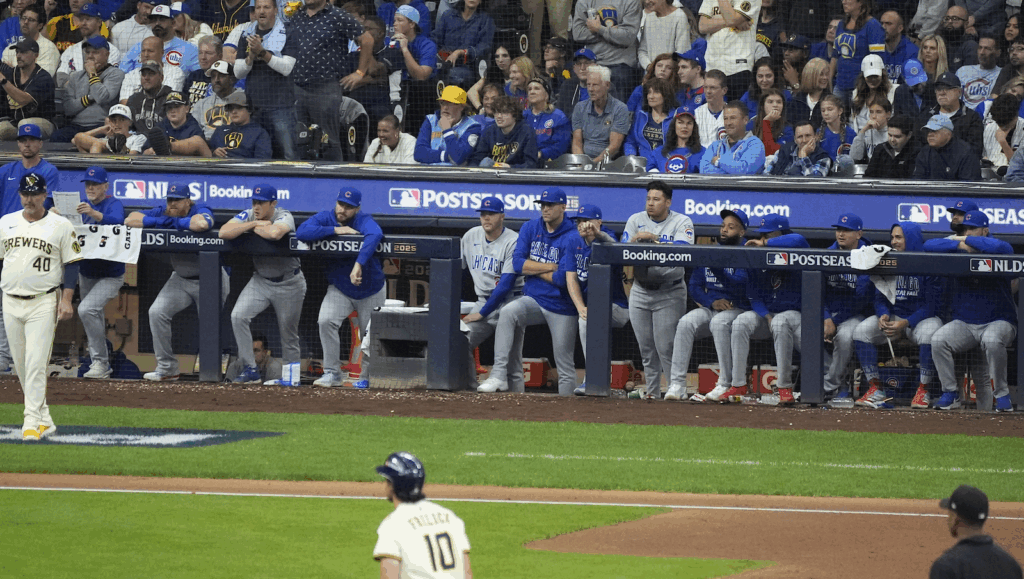MILWAUKEE — For all the stress that fans endure in winner-take-all contests — like Saturday’s NL Division Series Game 5 — it’s the situation players dream of.
“These are the games you try to get yourself into, you work so hard to get into. You dream of playing in them in the backyard. That’s the best part of it,” Cubs manager Craig Counsell said before the game at American Family Field. “When all the other stuff — that’s there, the finality of it, the stress of it, that’s all there — but I think if you flip it to know that, man, this is what I worked so hard for, that’s when you get to a place where your best self comes out.
“And that’s all you can ask. Your best self comes out. And we play the game, and let’s go.”
But reality doesn’t always match up with your childhood dreams – as was the case for the Cubs. They dropped a heartbreaking 3-1 contest to their northern rivals, ending their season at the NLDS. The Brewers advance to play the Los Angeles Dodgers in the NL Championship Series, which starts Monday.
It was a gut-punching way for the Cubs to end the season, as they finished a 2025 campaign that had so much promise in the summer yet ended on a chilly fall day in Wisconsin.
Here are three takeaways from the season-ending loss:
Bitter end
Unless the Cubs finished the year hoisting the Commissioner’s Trophy at the end of the year, their last game always was going to hurt.
This one, though, really stings because it comes against the pesky Brewers, who continue to outperform expectations. They continue to best the Cubs despite a smaller budget, fewer resources and even losing their manager to their rivals to the south.
The Cubs saw their season end in Milwaukee in 2023, then finished behind them in the NL Central for the second consecutive season in 2024. This felt like the year the Cubs could overtake the team that’s become the standard in the division.
And yet they finished behind the Brewers and were eliminated by them in the teams’ first postseason meeting.
The Cubs bolstered their lineup by adding Kyle Tucker last winter, but he finished 0-for-4 in the loss, and it’s fair to wonder if that’s his last act as a Cub. The offense was amongst the best in baseball in the first half, yet scored only one run in a game they needed to win.
The bullpen — the Cubs’ bugaboo in the first half of 2024 — was a strength down the stretch this year, yet it couldn’t be efficiently utilized Saturday because there never was a lead to hold.
When the raw emotions of Saturday’s loss fade, it’s fair to call this a successful season: The Cubs won 92 games in a division that sent three teams to the postseason. Yet, in many ways, it will feel like a missed opportunity.
Bullpen day
Counsell didn’t hide the Cubs’ plan 24 hours before Saturday’s do-or-die game.
“This is a game where we’re going to have everybody available,” Counsell said Friday. “With the exception of Matt Boyd, everyone’s going to be available.”
The bullpen was pretty good. But on a day when the margins were razor-thin, pretty good wasn’t enough.
Drew Pomeranz retired the first two batters of the game, then gave up his first baserunner of the postseason in a big way, as William Contreras hit a solo home run. That sent the capacity crowd of 42,743 into a roar, easing some of the tension they carried after their team had squandered a 2-0 series lead.
Seiya Suzuki’s solo homer in the top of the second evened the score, then Counsell turned to Colin Rea as his bulk option.
The veteran right-hander pitched two scoreless innings, then picked up the first two outs of the fourth. He was one strike away from recording nine scoreless outs, but he left a full-count cutter dead-center and Andrew Vaughn deposited it into left field for a go-ahead homer.
Rea then loaded the bases, forcing Counsell to bring in Daniel Palencia, who tossed 1.1 scoreless innings. The rest of the pen allowed only one run, but it didn’t matter after the Cubs’ offense mustered just four hits.
Missed opportunity
The Cubs knew that, in a game like this one, it’s all about applying pressure offensively.
“I think in bullpen games, blowing up the plan, as much as you can and try to introduce some chaos to that plan is offensively how you can derail it,” Counsell said. “But in the end, it’s just win pitches, have great at-bats, put pressure on them.
“Whether it’s a bullpen game or a starter from the other side, that’s what you have to do offensively.”
An ideal situation arose in the sixth.
Michael Busch hit a lead-off single off Brewers left-hander Aaron Ashby, then Nico Hoerner was hit by a pitch, injecting that “chaos” into the Brewers. With the heart of the lineup due up, the Cubs were licking their chops.
The Brewers pulled the Cubs’ plate back.
Ashby struck out Tucker, then Brewers manager Pat Murphy turned to Chad Patrick to face Suzuki — who’d already homered earlier in the game. Suzuki flew out to left field this time, then Ian Happ struck out looking to stymie the threat.
The Cubs just didn’t put enough pressure on the Brewers, as Counsell said they must. They mustered just four hits, and Busch was the only runner to advance into scoring position. They finished the playoffs hitting 5-for-40 (.125) with runners in scoring position.
That’s not a recipe for success, and that was proven Saturday.

